- Latest News
- Ocean Conferences
COP28 Outcomes: The beginning of the end of fossil fuels

Everything you need to know about COP28 outcomes.
After a gruelling set of negotiations which dragged on well into the night, a new deal has finally been agreed at the UN climate summit COP28, in Dubai, UAE.
COP28 outcomes: ‘Fossil fuels’ finally make the cut.
In the face of colossal opposition from the world’s oil producing countries, and despite the highest number of fossil fuel lobbyists at COP than ever before, a global consensus has been reached. The world has finally agreed to transition away from fossil fuels.
For the first time ever, the elephant in the room has been addressed. ‘Fossil fuels’ have made it into the official outcome agreement at COP28.
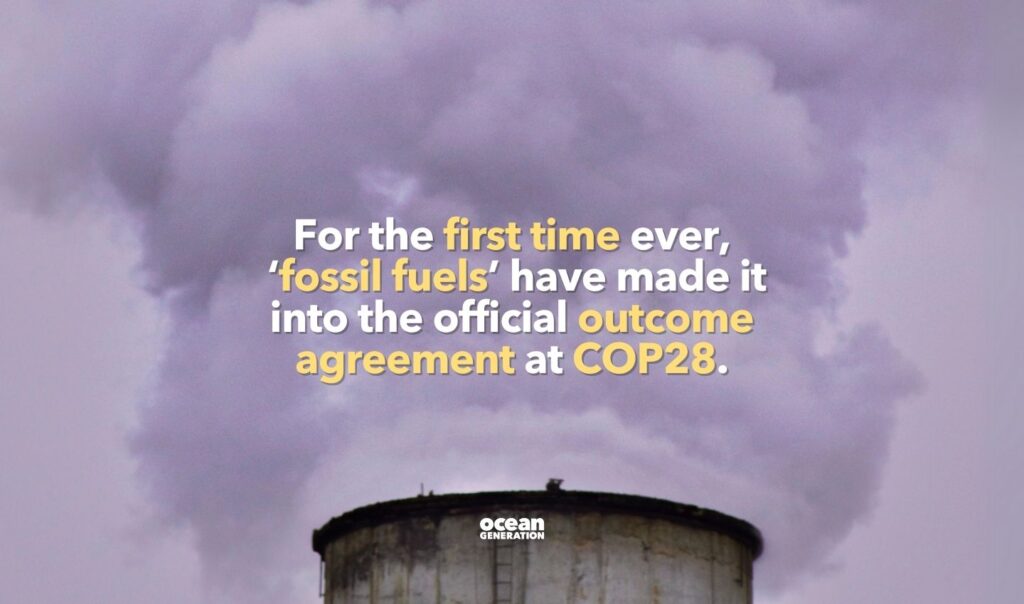
This is the biggest step forward for climate since the adoption of the Paris Agreement in 2015. And the COP28 agreement signals the beginning of the end of the fossil fuel era.
The agreement follows the widespread fury sparked by an earlier draft, which was deemed a “death sentence” by representatives from Pacific Island nations. The new document calls on countries to “contribute to global efforts to transition away from fossil fuels in energy systems in a just, orderly and equitable manner.”
The deal also calls for a tripling of global renewable energy capacity and doubling of energy efficiency by 2030.
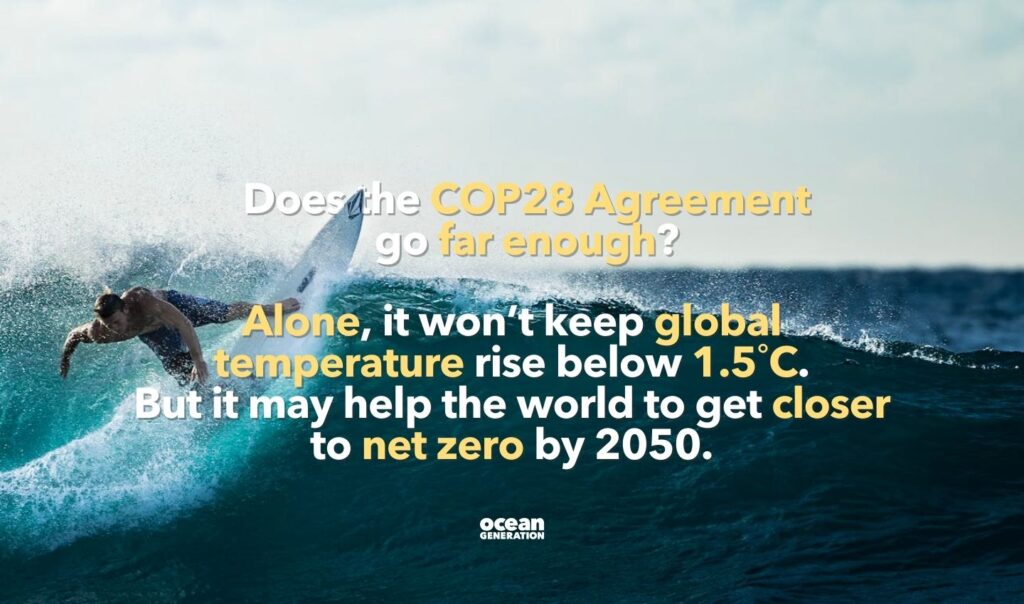
Does the COP28 Agreement go far enough?
Despite the standing ovations as the new COP28 agreement was passed, many nations have criticised the final decision. And there are concerns that it hasn’t gone far enough.
With just six years left until 1.5 degrees becomes inevitable, it’s not the “phase-out” that we had all hoped for.
Put simply, the language of the text was weaker than many countries wanted.
There was no mention of coal or methane (the most potent greenhouse gas). A finance path to aid the transition for developing countries was also missing. There was also no request for developed countries to take the lead on the transition away from fossil fuels. This raised further criticisms over the fairness of the deal.
A ‘litany of loopholes’ scattered within the text provides enough ambiguity for fossil fuel producers to continue ramping up production. Examples include ‘abatement’ (A.K.A CO2 removal); ‘transition fuels’ (A.K.A gas), and ‘fossil fuel subsidies’ to name a few.
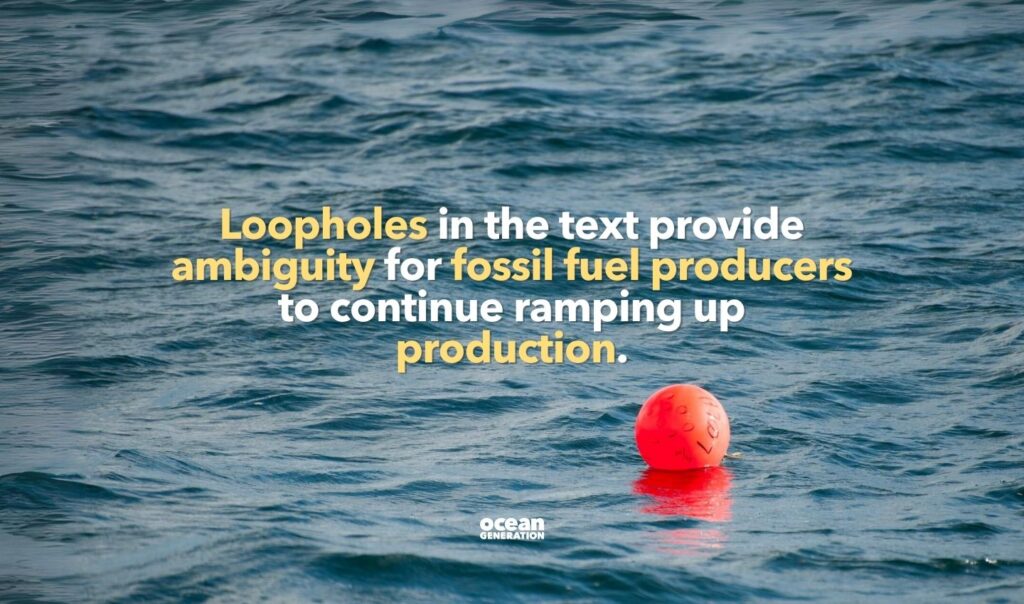
This will have devastating consequences. Particularly, for the most vulnerable communities who are already bearing the brunt of the worsening impacts of climate change.
Opposition to the new deal was voiced by a representative of Small Island Developing States (SIDS). The SIDS said: ‘You agreed the deal when we weren’t in the room’. This was meant literally (delegates from SIDS were still discussing their response to the text when it was agreed further down the hall). However, it also reflects that these nations feel overlooked, despite being the hardest hit by climate change.
Does the COP28 Agreement go far enough?
The agreement alone will not be enough to keep global temperature rise below 1.5˚C. But it may help the world to get closer to net zero by 2050. That’s if individual countries put a rapid transition to green energy at the heart of their new NDCs.
Here are some reactions from top climate scientists:
“At my lowest points as a climate scientist I did not think I would see a COP agreement that includes wording on the start of transitioning away from fossil fuels in my lifetime.”
– Prof Mary Gagen, Climate scientist, Swansea University
“The agreement, though inadequate, is an essential and sustained baby step towards the goal of limiting human caused climate change.”
– Prof Richard Allan, Climate scientist, University of Reading
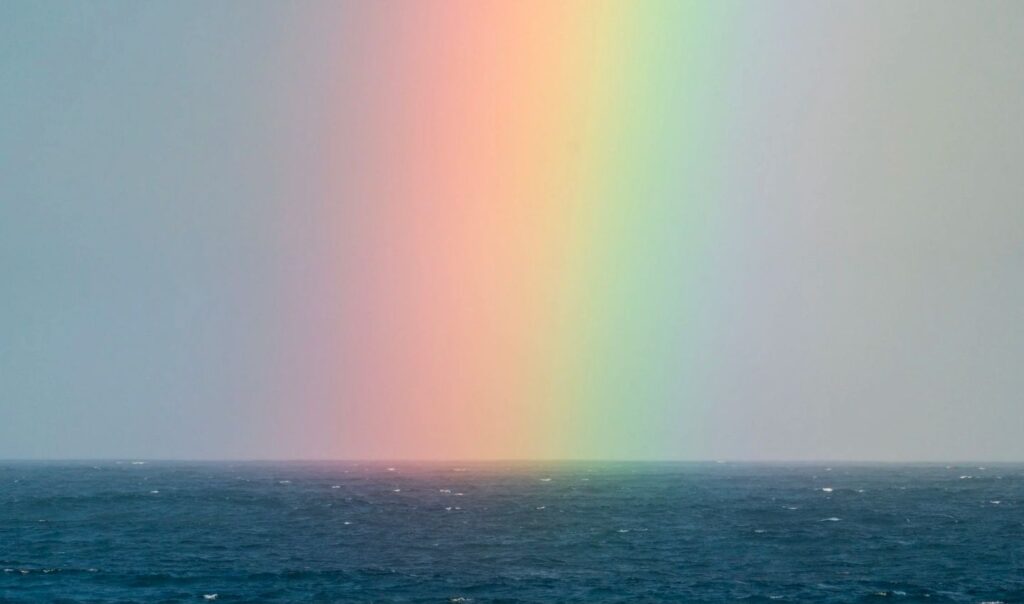
How does the Ocean fit into COP28 outcomes?
Multilateralism (alliance between countries to achieve a common goal) connects us all, and so does the Ocean.
This was recognised during the Nature, Land Use and Ocean’s Day. Countries, non-state actors and other stakeholders came together in support of nature-based Ocean and climate action.
Here are our top three Ocean-wins from COP28:
- The importance of maintaining the health of our Ocean is getting recognised.
During the Nature, Land Use and Ocean’s Day, 18 countries pledged to implement Sustainable Ocean Plans. These plans are supported by the official launch of Ocean Breakthroughs.
These will provide a roadmap for change and aim to catalyse momentum across five key areas. Namely, marine conservation, shipping, aquatic food, coastal tourism, and marine renewables. These contributing countries represent 50% of the world’s coastlines and close to 50% of global Exclusive Economic Zones (EEZ’s). - There’s an increased appreciation that the Ocean can provide solutions for mitigation and adaptation.
$186 million of new funding was pledged towards investment in nature-based solutions and Ocean-action. The Mangrove breakthrough was also formally endorsed by 21 countries. Its global goal is to protect 15 million hectares of mangroves. - And a growing acknowledgement of the need for synergy between climate and biodiversity targets.
The joint statement on climate, nature and people was signed by 20 countries. It seeks to align action on climate change, biodiversity loss and sustainable development. It recognises that a healthy Ocean will provide benefits across all three avenues.
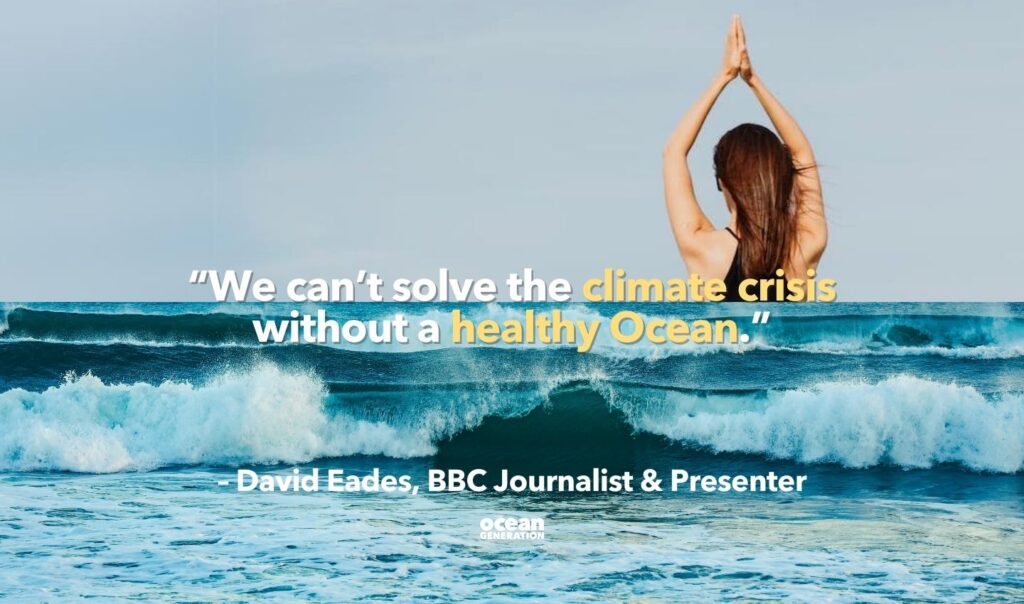
What happens next?
For world leaders: While the COP28 decisions are not legally binding, Parties (countries) are obliged to act in accordance with the outcomes of this process. It’s time for world leaders to head home and begin delivering on the promises made. Individual countries are required to submit stronger action plans in their next round of Nationally Determined Contributions (NDCs) in 2025.
For COP: Fossil fuels have officially entered the global conversation. The work now begins to tighten this language and ensure a fair, equitable and just transition at COP29 in Azerbaijan, and beyond. To ensure a liveable planet and a healthy Ocean, we need a full ‘phase-out’ of fossil fuels before it’s too late.
For us: Together, we must ride this growing wave of hope and momentum, to continue advocating for stronger Ocean-action.
Stay up to date with all things Ocean:
We’re known for translating Ocean science into engaging content. See what we’re all about on your favourite social platform or make a donation to support our charity:




